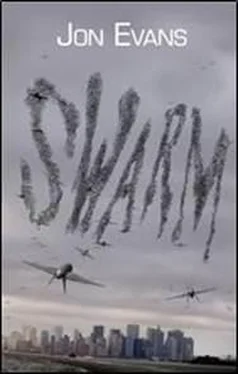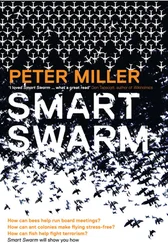“Come on in,” Lisa said, “you can meet the biohackers.”
“Oh joy.”
Her eyes narrowed, and she put a hand on my shoulder. “You OK?”
“What do you think?” What we were about to do felt like suicidal insanity. I felt like I was strapped into a roller coaster from which no passenger emerged unscathed, as it inched its way up to its first breakneck dive.
“Want to talk about it?”
I sighed, shrugged, pulled myself together, and shook my head. “I’ll be fine. Thanks. I’ll do some deep breathing. Enjoy the moment, right?”
“Right.”
The biohacker twins, Ravi and Ratri, sat in the dining room with Jesse, LoTek, and LoTek’s girlfriend Danielle. They were short and squat. LoTek was a tall man with thinning hair, pale skin and green eyes; Danielle was slim and fit, with short dark hair and traces of crow’s feet.
He had brought the tools of his trade. A nearby mahogany desk was strewn with the carcasses of computers and mobile phones. Metal suitcases yawned open like giant chrome clamshells full of technological accoutrements. LEDs winked on a squat metal box that looked like an unholy cross between a cannon and a small refrigerator. The overall effect amid that seven-star luxury was a bit like Versailles as conquered by Hiro Protagonist.
As we entered the mood was light-hearted and jovial, which seemed incredible, given that we were days from massive planetary disaster and about to declare war on the U.S. military. I supposed the others had a mindset which allowed you to do that sort of thing and keep smiling. Maybe that was part of what made extraordinary people extraordinary. It was harder for me.
Jesse looked up at me. “Looks like everything’s ready. And time’s a-wasting.”
I nodded grimly, and quoted: “If ‘twere done when ‘twere done, then ‘twere well ‘twere done quickly.”
“Everybody got everything?” Danielle asked, in her honey-smooth American voice. “Any last-second second thoughts?”
There was no reply.
“Then let us do this thing.” Jesse stood. H grabbed one of the packs resting on the wall behind him. Lisa and I took the others.
“Don’t do anything crazy,” Danielle warned us. “You’re no good to anyone dead.”
“Luck is for amateurs,” LoTek muttered.
She gave him a long-suffering look.
Lisa and I followed Jesse to the elevator. It descended and opened to the Burj al-Arab’s eight-hundred-foot-high atrium, decorated in marble and solid gold. I did not find it as overwhelming as I had on first acquaintance. I felt queasy, and it was not the elevator’s fault. I felt like we were en route to our doom.
First, though, Sharjah, a satellite city some twenty kilometres north of Dubai. From inside a taxi it seemed little more than an endless smear of steel and concrete. Its cargo airport was a hive of activity, perfumed with jet fuel and soundtracked by howling propellers.
Lisa somehow navigated us through the madness to a battered Russian-built turboprop cargo plane. Its interior was a cave of nicked and dented metal, labelled in faded Cyrillic. Only a table adorned by a samovar relieved the feeling of having been eaten by a steel maw. A small staircase led up to the cockpit, where I caught a glimpse of our pilots, one slight and bearded, the other obese and bald. The propellers sputtered into life and we taxied forward. Some thing or things clanked and rattled loudly beneath my feet as we roared down the runway, but we made it into the air.
“Get some rest!” Lisa shouted to me. “You’ll need it!”
I thought of our first flight together, from California to Colombia. Things seemed to have somehow come full circle. Once again I lay on a mattress made of scavenged life jackets, and once again my thoughts turned to Sophie’s betrayal.
Eventually, somehow, despite that gut-wrenching roller-coaster feeling, I fell asleep. When I woke we were high above Afghanistan.
“Buckle up,” Lisa said. She had changed into a desert-camouflage uniform that said MARTINEZ and AIR FORCE. “Apparently the local Taliban have mortars, so ground control are requesting all incoming aircraft perform a tactical descent. Better known to the military cognoscenti as a death spiral.”
We strapped ourselves into uncomfortable metal chairs near one of the tiny portholes. From above, Logistics Staging Area Python, the largest military base in Afghanistan, looked like a child’s sandbox full of thousands of military toys. Dozens of helicopters littered the runways; fighter jets, cargo planes, and Predator drones perched in huge igloo-like hangars; rows of gunboats sat inexplicably on arid desert.
I grabbed the bare metal arms of my seat tightly as the Antonov nosed into what felt like a plummeting dive, followed by a viciously tight 360-degree turn, then another stomach-wrenching dive. The plane dragged back to level only just in time to land, and we braked so hard that the samovar spilled tea over the barren metal hold.
“Welcome to The Stan,” Lisa said.
“Did you serve here?” I asked.
She shook her head. “Came here once on DEA work. Doesn’t matter. Big bases are pretty much all the same.”
“Like five-star hotels.”
She snorted. “Not exactly.”
I reached down to touch the faux ID card hanging from a lanyard on my chest, as if it was some kind of voodoo-magic mojo. Only it stood between me and instant imprisonment. Lisa got up to work the ramp. Jesse grinned at me, obviously surfing on the same wave of adrenalin that had swamped my mind.
“Well, Maverick,” he said, “once again, here we are.”
“I blame you.”
He nodded complacently. “You always do.”
Sunlight spilled into the hold. The landscape outside was as flat as a pounded pancake, baked mud and gravel and pavement, but with more trees than I had expected. Everything was pale, low-contrast, all colour drained away by the scorching sun. War-torn Afghanistan. If two weeks earlier I had been asked to make a list of all the places I never expected to find myself, it would have been way off the top of the page.
We walked down the ramp to the arrival tent, an forty-foot-square canvas edifice surrounded by sandbags, covered by camouflage netting, and full of bored-looking soldiers in folding chairs. I tried not to betray my tension as Lisa strutted up to the arrivals desk, our order papers in one hand, her ID card in the other. If things were going to go terribly wrong they would start right here and now. But according to LoTek, he had spent years hacking into the US military, he had full access to their ID systems; and according to Lisa, on a base as big as LSA Python, you were who your ID card said you were.
They were both right. As far as the soldiers knew, we were worthy of no particular attention: an Air Force lieutenant and two civilian contractors flown in by one of the private air-cargo companies that serviced the base, just three of the hundreds of people who arrived and departed every day. I started to breathe easier. After all the tension and buildup, this felt like a banal anticlimax. I devoutly hoped it stayed that way.
“OK,” Lisa said to Jesse, after we exited the tent again, “you got more prep to do than us. You know where you’re going? And where to turn up?”
He nodded casually.
“You’re sure?”
“I’m sure.” He looked at me. “Later.”
Our customary unceremonious farewell. I nodded. “Later.”
“C’mon,” Lisa said to me as he walked away, “Let’s hit the DFAC. If you’re going to do some kind of insane shit, at least do it with some food in your belly, I always say.”
“DFAC?”
“Dining Facility. Nearest one’s just down Pennsylvania Avenue.” She indicated a main road not far away, thick with Humvees, minibuses, weird armoured military vehicles adorned with.50 caliber machine guns, and huge construction vehicles carrying entire shipping containers with their scorpion-like arm. “Walking distance.”
Читать дальше












